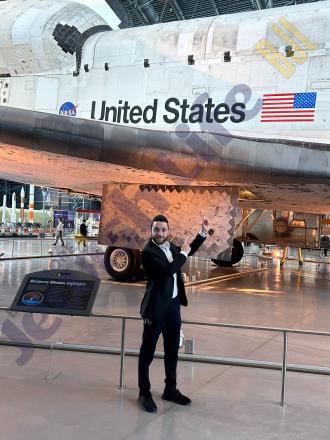US politics expert speaks about the importance of debates and gives his tactical recommendations for the candidates.
As the world turns its eyes to Hofstra University in Long Island for the first presidential debate between Hillary Clinton and Donald Trump Monday night, Arutz Sheva spoke with Professor Tamir Sheafer, an expert on American politics from the Hebrew University about what to expect in the hotly anticipated debate.
TV network executives are saying that viewership for the debate could be as high as 100 million, a number only ever hit by the most watched program in America, the annual NFL Super Bowl. It would also surpass the record for presidential debate of 80 million set in 1980 (fittingly enough) by the Ronald Reagan-Jimmy Carter debate that saw the beginning of a momentous conservative resurgence in the US.
There are even debate "viewing parties" planned at several venues across America, where crowds will congregate to watch the debate together - while having a drink or two. Many attendees at Paris' fashion week are reportedly setting an alarm for the middle of the night so they can watch the debate live.
At the beginning of the Arutz Sheva interview, Professor Sheafer was asked if he thinks it is possible to have a substantive debate that will deal with fundamental issues that are important to Americans, given the extremely hostile nature of the campaign so far and the polarization that it represents. Sheafer thinks it certainly is possible, based on an in-depth study he conducted with an American colleague.
The two researchers studied political debates from Israel and the US occurring from the time when debates started until the mid-2000s, and "the analysis showed that candidates are able to convey important and substantive information within the debate format. It's not just personal attacks. It's personal attacks too, but not only," says Professor Sheafer.
"These two candidates are light-years away from each other in terms of ideology and attitude toward several issues, and therefore they could have a very substantive discussion about issues such as immigration, women and minorities, which are issues Clinton will want to raise. Trump, for his part, will want to link Hillary to the failures of the Obama administration, the Email scandal, and other aspects of her personality. There is a lot of disagreement between them over the direction America needs to take."
So how much influence do debates have on public opinion?
"We know that after debates you see changes in public opinion. Sometimes these changes are only significant in the short term and then things go back to the way they were [like after the first Romney-Obama debate, when Romney gained a lot of short-lived support], but in a campaign this tight any half of a percent can be decisive."
Professor Sheafer brought the debate between John F. Kennedy and Richard Nixon in 1960 as an example of a very influential debate, as many experts claim that it was that debate, the first ever to be televised, that swung the election in the direction of Kennedy. "Nixon wasn't ready for the format. He was unshaven, he didn't look directly at the camera." Sheafer also mentioned an Israeli equivalent, the debate between Binyamin Netanyahu and Itzik Mordechai in 1999, when Mordechai said: "Bibi, look me in the eye" and got Netanyahu flustered. The winner of that exchange was actually Ehud Barak, who wasn't present at that debate, but it hurt Netanyahu significantly all the same.
Another example is the debate between Netanyahu and Shimon Peres ahead of the 1996 election.
"Peres went in with polls predicting he was going to win. The elections were 3-4 days later, and it was clear that Netanyahu had won the debate. Peres made all the possible mistakes and Netanyahu did the job well."
The 1996 election is remembered as a big surprise, as the exit polls on the night of the election showed a Peres victory, before it became clear in the morning that Netanyahu had actually won. That victory launched Netanyahu's vaunted Prime Ministerial career.
When asked to give brief advice for the two candidates Professor Sheafer answered with one bit of counsel for both of them - "don't get dragged into issues the opponent wants to talk about, because your opponent wants you to talk about issues in which he/she has the advantage." In practice, this means that "if Clinton wants to drag Trump into a conversation about his Mexican wall and immigrants he needs to put the ball back in her court. Clinton needs to avoid speaking about her Emails and personal integrity. She absolutely cannot go into the subject of [her husband] Bill's affairs or anything that Trump will want her to sink in.
"Hillary needs to make the gap in experience between her and Trump become obvious, and Trump needs to talk about her personal issues such as her age and health condition."
As a follow-up to the Professor's strategy recommendations, he was asked if this sort of tactic of deflecting questions might not end up hurting a candidate who will be seen as avoiding tough questions. Sheafer claims that there are many ways to deflect questions and there are better ways to do it than others. Israelis are familiar with these tactics from Netanyahu's interviews, where he often deflects by saying things like "that's not the question, this is the question" and then takes the conversation where he wants it to go.
Regarding the debate simulations that take place in the candidates' headquarters, Sheafer says that these feature the boldest questions possible in order to prepare the candidates for any eventuality. "Sometimes the candidates are offended by the questions in the simulations. They are an opportunity for various campaign staffers to get back at them by asking uncomfortable questions, but the exercise is absolutely necessary. You cannot allow yourself to be surprised."
Sheafer wished to emphasize that though the debates are important, it is possible to recover after a bad showing, as Barack Obama did after an abysmal effort in his first debate against Mitt Romney.

















